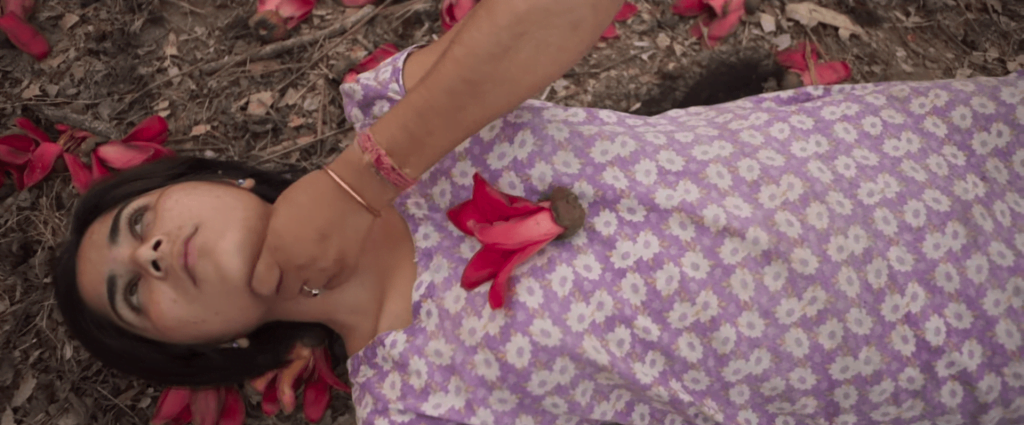“Don’t worry. If you listen to people, your life will be ruined. Do what your heart says. Look! There is a rainbow. Look! Up there…Yes! After a long time!” This is the note the wonderful masterpiece ‘Bulbul Can Sing’ ends on and leaves the viewer with mixed feelings of hope and the fear of the unknown. This underappreciated work of Rima Das makes one want to sing and urges them to claim their story as they like.
I might have given some spoilers in this review. So read at your own risk.
Bulbul Can Sing 2O18
Cast: Arnali Das, Banita Thakuriya, Manoranjan Das
Director: Rima Das
The Assamese film, Bulbul Can Sing is a story of three teenage best friends, Bulbul, Bonny and Suman who are trying to find themselves while simultaneously dealing with the patriarchal society they are a part of. Their experiences and journeys are extremely different and yet too similar. All of them feel this constant need to find a middle ground between fitting in their surroundings and exploring themselves with respect to their likes, dislikes, sexuality et cetera.
Even though the title suggests that it’s a movie about a character called Bulbul, it becomes much more than that. Besides narrating the story of Bulbul, it situates her in a social context and scrutinises her relationships with other people and the situations and conditions of those people as well. It presents to us a wholesome view of reality, as it really is.
Even though the title suggests that it’s a movie about a character called Bulbul, it becomes much more than that. Besides narrating the story of Bulbul, it situates her in a social context and scrutinises her relationships with other people and the situations and conditions of those people as well.
One Woman Show
While most mainstream films have a team consisting majorly of men who are working on it, Bulbul Can Sing is a work of a single woman who subverts all the set standards of direction. Rima Das is the director, producer, cinematographer, and editor of this astounding piece. She single-handedly takes up these roles and justifies them so beautifully. She was born and brought up in a small village in Assam, and her first-hand experiences give her a finer vision to portray them through her camera.
She has made two films until now (including Bulbul Can Sing) and both of these have received wide acclaim and appreciation. Her very first film Village Rockstars which was also single-handedly made by her was premiered at the 2017 Toronto International Film Festival and won the Best Feature Film ‘Swarna Kamal’ award at the 65th National Film Awards along with many others. This film was also set in a small Assam village and created an enormous impact with its simplicity.
Bulbul Can Sing also received a lot of national and international appreciation in terms of awards and fame. It was screened in the Contemporary World Cinema section at the 2018 Toronto International Film Festival and also won the National Film Award for Best Feature Film in Assamese at India’s 66th National Film Awards. Its stark similarities and differences with Village Rockstars makes it even more appealing to the viewer. The already set expectations were beautifully surpassed by Das with Bulbul Can Sing.
A Roller Coaster Ride
The movie begins with Bulbul and her friends playing in a forest-like area and shows all of them in a very cheerful light. This scene makes the viewer comfortable and lends a sense of ease about the setting. This joyful setting in the movie goes on for quite some time when suddenly the movie robs the viewer of their passivity and pesters them into becoming as engaged as the characters.
The viewer finds themselves swept into vertiginous cycles of pain, anger, joy and exaltation. The emotion of the movie changes even before the viewer can make sense of the previous scene. The lovely sweet friendships and teenage love stories suddenly turn into the biggest tragedy of their life. This unanticipated shift in the mood from joyous to bleak, changes the entire narrative of the movie and furnishes it with some beautiful and poignant scenes.
The movie deals with a lot of themes of self acceptance, agency, sexuality, subverting patriarchy and set rules, friendship, adolescent love and undertones of parent-child dynamics.
Themes
The movie deals with a lot of themes of self acceptance, agency, sexuality, subverting patriarchy and set rules, friendship, adolescent love and undertones of parent-child dynamics. Bulbul gets involved in a relationship with a classmate just like her friend Bonny, while Suman is struggling to fit in with his other friends who call him “ladies”. Their friendship irrespective of their different struggles is beautifully portrayed and stays strong in the narrative.

The story mirrors the patriarchal society quite aptly. The very beginning of the movie showcases the limited beliefs when Suman tells Bulbul, “So, just listen to me and tie your hair” because if she won’t a ghost will come to catch her. It becomes more overt as the movie goes forward in the form of being told to be modest and how anger is not meant for girls, checking the clothes they wear, the inappropriate non consensual touch from the male teacher, defined ‘masculine’ and ‘feminine’ roles and so much more which is excruciatingly horrid (I am not writing them here because they might reveal everything).
The theme of sexuality and identity is so grippingly portrayed through Suman, who becomes a really pivotal character in the movie. His dialogue when he says, “How is it my fault? God made me like this. Am I the only one in the world like this?” moves the viewer into tears full of anger.
The story becomes sad and beautiful at the same time because it not just portrays the truth, but rather critiques it while also lending a sense of relief to the viewer.
Technicalities
The use of non-professional actors gives the movie an undistorted and realistic touch. Their acting is pure, raw and is mostly their lived experience. The entire movie seems so natural because of its fleshed out characters. Das’s camera captures every detail vividly. Bulbul trying to feel the grass, flowers, trees, insects et cetera is so amazingly and astutely depicted by the proper use of camera.

The editing and shots in the movie considering that it’s the single-handed work of Das is phenomenal, even with some out-of-focus shots. Every other shot seems logical and coherent. The inspiration from various art cinemas is evident all throughout the movie.
Bulbul Can Indeed Sing
The title of the film becomes extremely prominent with respect to a lot of things. In the movie, Bulbul’s father has a dream for her to become a singer. Bulbul’s lack of self-confidence makes it difficult for her to sing her heart out, but something happens and it changes her for the better. She can sing. She can sing beautifully. Even the name Bulbul (nightingale) is a name of a bird who has a beautiful voice.

The title also depicts the reclaiming of her identity, which is a radical change for her, and she embraces it with great courage. Through this, she transgresses all boundaries that entrapped her, questions patriarchy in her own way, and becomes her own warrior. The scenes wherein she sings unapologetically becomes a sight to behold. Her overwhelming confidence lends some hope for a change in a poignant setting. She is truly liberated through her singing.
The Ending
The ending of the movie is bewitching. The sky is seen ornamented with a beautiful rainbow. The rainbow which in itself is a sign of acceptance and claiming oneself becomes exceedingly crucial to the movie. It helps everyone, the viewers and the characters make peace with oneself and the surroundings. It subtly puts forth how any big change is only plausible when we accept ourselves just as we are. Acceptance of self is radical and contagious, and the movie leaves no stone unturned to showcase it.
“Surpassed by fear. Sagging with tradition. In a town stymied with conformity, the bravest thing they can do is to be themselves.”



